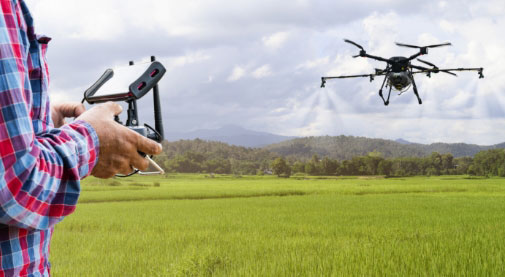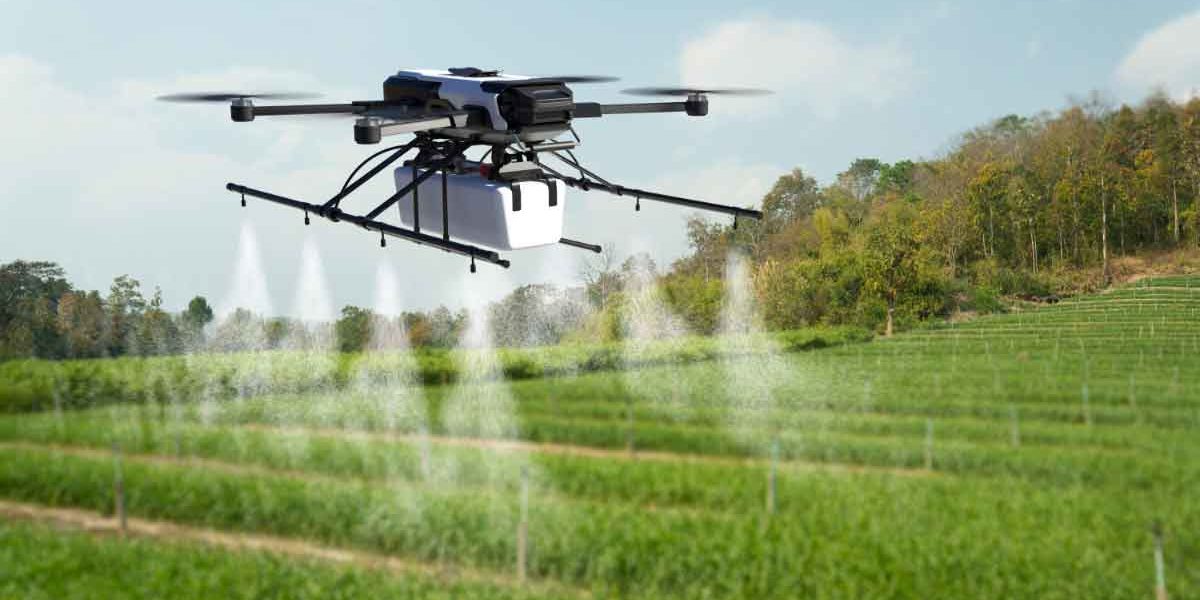The Market Insights
The market of Agricultural Drones has gained momentum given the rising demand for quality food crops due to the growing population, increasing adoption of advanced technologies to enhance crop production, and raising venture funding.
As per the report by Mordor Intelligence, the agriculture drones market is anticipated to reach a CAGR of 7.1% during the forecast time-period of 2021-2026. The event of the pandemic has raised the importance and requirement of digitalization in every sector. Thus many agritech companies have come up with innovative models for easing the farming practices by focusing more on wireless platforms like drone technology to enable real-time decision making concerning yield monitoring, crop health monitoring, field mapping, irrigation scheduling, and harvesting management, etc. for enhancing the agriculture productivity.
Moreover, the credit for the growth of the Agriculture Drones market also goes to the growing adoption of mobile devices, and advanced technologies in components such as mapping software, camera, and others are projected to back the growth of the agricultural drones market.
Drones in Agriculture: The Best Practices
Agricultural drones are meant to enable farmers to automate farm activities and improve crop yield. They can be employed for various applications in agricultural lands and farms like that of crop scouting, crop health monitoring, weed detection, variable rate application, and livestock management. Take a look at the best drone practices in the agriculture setup:
Monitoring Irrigation:
Drones play a major role in elevating irrigation efficiency by helping improve water efficiency and providing potential pooling or leaks in irrigation. With their different sensors like the hyperspectral, thermal, or multispectral, Drones aid farmers in detecting areas that are too dry or need improvement.
Monitoring & Surveillance Crop Health:
Crop Health Monitoring & Surveillance has taken up a new level with the advent of Drone technology. With the help of drones, farmers can track the health of the vegetation and see which plants contemplate different amounts of green light and Near-infrared spectroscopy (NIRS) light. Drone technology also helps spot bacterial or fungal plagues, thereby saving crops in their early stages. In cases of crop failure, the drone also helps provide accurate evidence when claiming insurance.
Assessing Crop Damage:
Agricultural Drones decked with multispectral and RGB sensors also detect field areas inflicted by weeds, infections, and pests. According to this data, the exact amounts of chemicals needed to fight these infestations are known, and this helps diminish the costs inflicted by the farmer.
Analyzing the Field Soil:
Details about the land’s soil condition stand vital to farming. Drone technology allows farmers to obtain the same information with multispectral sensors. These sensors enable seizing data useful for seed planting patterns, thorough field soil analysis, irrigation, and nitrogen-level management.
Planting the Plants:

Planting stands to be a very intriguing application of Drone technology. Drone-planting systems allow drones to shoot pods, their seeds, and crucial nutrients into the soil. This technology doesn’t only reduces costs by almost 85% but also increases consistency and efficiency.
Safe Chemical Spraying:
Drones providing agricultural spraying stand of great importance to farmers as this draws out the risk of human contact with harmful chemicals. These drones containing RGB and multispectral sensors can precisely identify and treat problematic areas.
Tracking One’s Livestock:
Track and monitor the movements of your cattle with Agricultural Drones. Livestock Tracking employs thermal sensor technology to help you find lost animals and detect injury or sickness.
The Merits of Drone + Agriculture
Elevating Production:
Agricultural Drones are adept in enhancing farm production by providing comprehensive irrigation planning, adequate monitoring of crop health, increased knowledge about soil health, and adaptation to environmental changes.
Dynamic Techniques:
Drones can adapt to weather conditions, alongside providing regular updates to farmers about their crops to help them develop strengthened farming techniques.
Farmer’s Safety:
At places where farmers cannot reach, like infected areas, terrains with taller crops, and places with power lines, drones stand to be a more convenient and safer option.
Apart from these, Drone Technology enriches the Agricultural sector with quick inputs and insights for faster decision-making, resource optimization, high accuracy rate, support and evidence for insurance claims, and more.
Provided the invaluable benefits of Drone technology in the farming sector, it has been noticed that governments across the globe are also easing the restrictions for drone usage. This poses one of the other major benefits for the farmers and the plant-growers when it comes to digitizing the agriculture arena.
The Road Ahead
Being capable of lending immeasurable value to the farming sector and transforming its traditional farming methods in uncountable ways, Drones can fairly be mentioned as the future of the Indian Agrarian Community. Indulge in Drone technology for your farms and transform your projected production into reality with ease and advancement. Connect with Teksun’s tech experts and kick start your journey to harness the merits of the great pack of Drones and Agritech.



